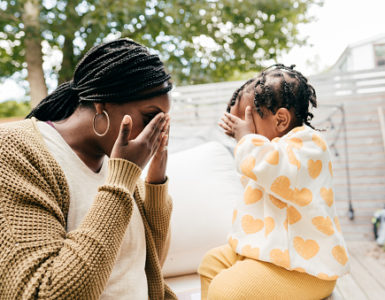Anyone contemplating adopting a child in PA or creating an adoption plan for their baby may be wondering where to start. You may be searching for information on how adopting a child in PA works as an expectant parent facing an unplanned pregnancy, facing a difficult parenting situation, or as a hopeful adoptive parent wanting to build your family through adoption. There is a lot of information available on adopting a child in PA and understanding the basics of the process will go a long way in helping you take a deep breath and the first step on this journey of adoption.
1. Who Can Adopt in PA
Anyone looking for more information on adopting a child in PA will need to first understand the requirements for adoption in the Commonwealth of PA. These statewide adoption qualifications vary based on the type of adoption you are planning to complete and differ in regards to the adoption service provider you choose to use to complete the adoption, but more on that later. Adoptive parents who are adopting a child in PA from the foster care system have different requirements and a slightly different process than adoptive parents who are adopting a child internationally to bring home to Pennsylvania.
Pennsylvania is known as a very friendly state to adoption; it is considered one of the least restrictive states regarding who is eligible for adopting a child in PA. Pennsylvania does not have a minimum age qualification for adoption. Also, no legal adoption age limit exists. In certain sibling adoption situations, minors have adopted their brothers or sisters. This is obviously rare, but it is possible.
The state of Pennsylvania may not have any restrictions on the age of the adoptive parent, but the adoption service provider completing the adoption will have a set of qualifications and requirements that hopeful adoptive parents must meet in order to adopt through their agency or law firm. Many adoption agencies or adoption attorneys require that individuals and couples be of a certain minimum age (usually around 22 to 25 years of age). There are also requirements that adoptive parents proceed through the adoption process under a certain professional.
Professionals usually have their own set of adoption requirements regarding age. American Adoptions requests that adoptive parents be between the ages of 22 and 50 (exceptions have been made). Those hopeful adoptive parents planning to adopt a child in PA from the foster care system need to be at least 21 years of age. If you believe your age may be an issue as an adoptive parent, you should discuss those requirements with potential adoption agencies you may use to finalize your adoption.
Many expectant parents who are creating or contemplating an adoption plan for their baby and those individuals and couples hoping to build their family through adoption may wonder if they must be married when adopting a child in PA. You do not need to be married when adopting a child in PA. Whether you are single, divorced, or widowed, you can be considered eligible to adopt a child in PA. If a hopeful adoptive parent who is married plans on adopting a child in PA, both spouses will have to adopt unless one of the spouses gives the other spouse their consent to adopt the child on their own. Most adoption agencies will have policies regarding requirements on the number of years a couple must be married or how many divorces they each may have in order to be approved for adopting a child in PA.
2. You will Need an Adoption Service Provider for Adopting a Child in PA
If you are contemplating placing your baby for adoption due to unforeseen circumstances or you are hopeful to build your family through adoption, you will need an adoption service provider, or ASP, to help you complete the adoption. This is simply to ensure all of the rules and regulations are followed in the Commonwealth of Pennsylvania.
An adoption service provider is either an adoption agency (also known as an adoption center), an adoption attorney, or a licensed social worker in your state who is approved to complete adoptions. Choosing a good adoption agency to help you in adopting a child in PA is an important first step. When choosing an adoption agency with whom you would like work to complete your adoption you may be wondering where to start. Getting a list of questions for the agency which can be answered through your research, by interviewing agencies, or by attending their information sessions is a good first step. These questions can include gathering information on what services they offer both expectant parents creating an adoption plan for their baby and hopeful adoptive parents. You will want an agency that equally respects all members of the adoption triad. The adoption triad is known as the birth mother (and/or birth father), the adoptive parent(s), and the child. A good agency will offer support to all members through the process, a great agency will continue that support long after the adoption is finalized. Asking about costs, how many adoptive families they work with, and how many birth mothers they work with on average can be helpful. It is also helpful to ask to speak with birth mothers or adoptive parents who used the adoption agency to complete the adoption. Looking online at adoption forums and asking about specific agency experiences can be helpful.
Adoption Agency
An adoption agency will likely be working with both adoptive couples and birth mothers and can work with both parties to be matched. Often adoptive couples will provide the agency with a photo album or scrapbook with photos of their family, pets, home, information about their interests, how they met, and what they do for a living. The birth mother then makes a decision regarding what couples she would like to meet or make a decision based on her findings in the profiles alone. The adoption agency can give you more information on how exactly they handle and support that process.
Adoption Attorney
Another option is to use an adoption attorney to help you in adopting a child in PA or placing your baby for adoption in PA. An adoption attorney is often used when the birth parents and adoptive parents have already been matched with one another, but that is not always the case. Sometimes a birth mother has found a hopeful adoptive family for her baby through online adoption profiles of prospective adoptive couples, church, social media, or through word of mouth. An adoption attorney can help the adoption triad work through the details surrounding the adoption and help with legal paperwork along the way. They can help work through birth mother expenses (those are expenses a birth mom incurs through the pregnancy and adoption process). Adopting a child in PA means that you can not pay a birth parent any living expenses if you both reside in the Commonwealth of PA. However, hopeful adoptive parents can compensate the birth mother for any medical and counseling bills she incurs during the pregnancy and adoption ensuring that the adoption is of no cost to her. If hopeful adoptive parents reside in another state, they may be able to pay for more birth mother expenses if she resides in PA. Your adoption agency or attorney can help you understand what is legal and appropriate.
If you decided to use an adoption attorney instead of an adoption center, you will need to use an attorney that is barred in PA and who specializes in adoption within the Commonwealth. A common mistake hopeful adoptive parents and birth mothers make is that they can use any attorney in the Commonwealth of PA to complete the adoption. An adoption attorney in PA will understand the specific applicable laws which govern adoption in the Commonwealth of PA in addition to the current federal laws surrounding adoption.
You may have an adoption attorney or adoption agency with whom you are already using to finalize the adoption and work with you through the adoption process. However, they may not be licensed in the state in which you live, whether that is PA or another state. If that is the case, if you are a hopeful adoptive parent, you will need a licensed social worker or home study agency to handle your home study. A home study is mandatory for adopting a child in PA. The home study is a long report including all of the information necessary for the social worker to approve you as fit to adopt a child. They will first interview you and your spouse or partner a few times, as well as any other adults in the home and children of a certain age. They will tour the home and ensure that there is a fit space for the baby and childproof measures in place. They will make sure the home is a safe and nurturing space for the baby and family. The home study will also include background checks for all members of the family over the age of 12. It will include financials, birth certificates, driving records, FBI livescan fingerprint checks, letters of recommendation from people in your life, and medical histories. Your adoption service provider will explain all of the details of the process, what items are required in the Commonwealth of PA, how long the process will take, and the cost. Once the home study is complete, it is time for the next steps.
3. What are the Next Steps for Adoption a Child in PA
After you have been matched with a birth mother or you have chosen an adoptive family for your child, the next steps are to hurry up and wait.
You will likely work during this time to create an adoption plan that includes the level of communication you would like post-adoption. The birth mother will be the one to decide if she wants an open, semi-open, or closed adoption. Open adoption means that she will contact the adoptive parents and child throughout the child’s life. She may visit, call at regularly agreed upon times, or be a very big part of the child’s life. That level of relationship is up to you. A semi-open adoption is that the child knows who the birth mother is and the birth mother is acquainted with the adoptive parents, but there may only be updates of milestones or a monthly email with no face-to-face contact. You may just want a scrapbook once a year. There is no right or wrong decision.
In regards to closed adoption, a closed adoption means that you will have no contact with the child or adoptive family. Your identity will be protected and the adoption records will be sealed. It is important to remember that adoption laws can change and records once sealed may be opened years from now. This is one of the many reasons closed adoptions are not as common.
After you decide on the level of communication, the birth mother may create a birth plan. The birth plan can include who she would like in the room with her during labor or how long she would like with the baby alone before the adoptive couple arrives.
Once the birth mother is finally in labor and the baby is born, the birth mother needs to wait 72 hours after the birth of the baby before she can consent to an adoption in the Commonwealth of PA. After 72 hours, she can sign the relinquishment paperwork consenting to the adoption and voluntarily terminating her parental rights to the child.
If the hopeful adoptive parents live outside the Commonwealth of PA, they will need to complete an Interstate Compact on the Placement of Children before returning to their home state. This is not applicable for adoptive parents adopting a child in PA who also live in PA.
While the actual adoption process legally concludes at the adoption consent paperwork signing, adoption is a lifelong journey for all people in the adoption triad. You have taken the first step in that journey by educating yourself on adopting a child in PA and the first step is the most important one.




